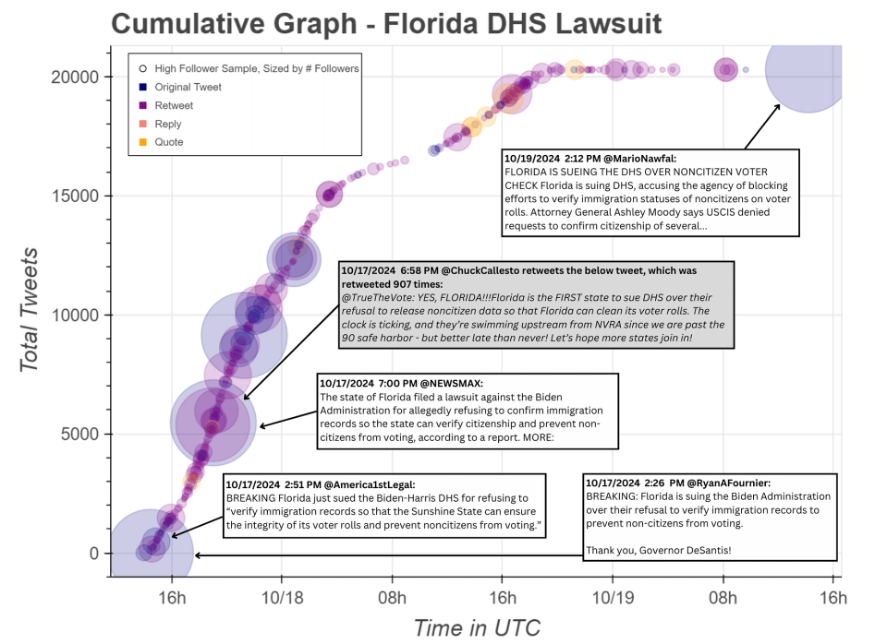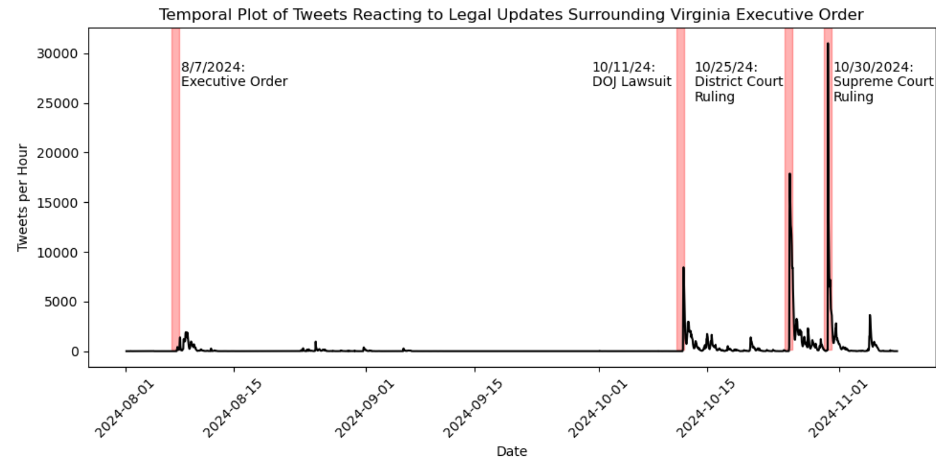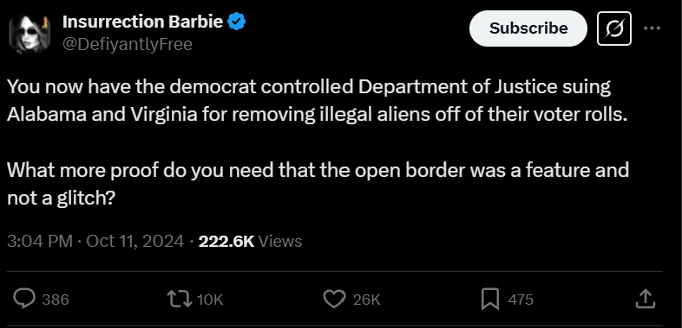How Strategic Litigation Feeds On and Fuels Political Narrative
Fringe election fraud rumors are becoming legal drama—weaponized lawsuits and policies that present fiction as fact on social media.
.jpg?sfvrsn=fd262d7d_3)
Life in Donald Trump’s America can feel like a courtroom soap opera, where each day brings a new manufactured controversy. At times it can seem as though the administration disdains the courts and the rule of law, but MAGA world embraces the judiciary not just for litigating legal change as they would like it to be but also for its dramatic potential in the court of public opinion. As interdisciplinary scholars of online rumors and persuasion tactics, we have observed an ongoing dynamic of how strategic MAGA politicos have taken emergent or fringe rumors about election fraud and propelled them into mainstream consciousness—not only through social media manipulation but also through litigation. Legal scholars must be aware of the storytelling function of this litigation—more specifically, how it blends lawfare with information warfare. These lawsuits, often drawing from internet rumors, are part of a larger strategy from the online Right that transforms fringe political propositions with scant evidence into litigation, popularizing narratives that once lived on the periphery. The story is as much the point as the law.
The courtroom wields real state power, but these cases blur the line between fact and fiction. Online rumors can be used to fuel legal challenges focused on rare, technical issues in voting, which, in turn, spark even more online debate about election integrity. This piece uses two original case studies from our 2024 election research to explore how these persuasion campaigns use strategic but often dubious legal action as a kind of “legal theater”—where simply engaging with courts or initiating legal processes can make a misleading political narrative seem legitimate. The mere act of filing the case is perceived as “proof” that the claim or alleged crime has happened and also serves to keep the rumor top-of-mind in the digital news cycle.
In election administration, there is always a tension between ensuring secure elections while minimizing unfair barriers that prevent eligible citizens from voting. Just as courtroom dramas draw inspiration from the generally mundane reality of legal practice, these lawfare persuasion campaigns distort the real need for election security in service of a dramatized false narrative claiming widespread election fraud. In recent years, the MAGA movement has leveraged the “rights vs. security” tension in election administration to seed online narratives and then mobilize them into lawsuits and policy changes. All of these efforts incite an iterative online rumor mill questioning the legitimacy and security of the vote. While these efforts may hypothetically drive nominal security improvements, they also threaten legal voters’ access to the polls when in fact the alleged security threats are demonstrably minimal and efforts to highlight them are politically motivated.
In the 2024 election, this political strategy converged with the latent anti-immigration sentiment that has been a hallmark of Trumpism for the past decade. Leading up to the election, the right-wing media and think tank apparatus fixated on the threat of illegal immigration at the U.S.-Mexico border, suggesting that migrants would attempt to or have already been voting. While numerous studies have shown that it is exceedingly rare for noncitizens to vote in U.S. elections, fears of noncitizens voting nonetheless persisted. Our research explored these narrative campaigns, including a peer-reviewed paper with debunked claims, misrepresented administrative errors, as well as viral undercover and decontextualized videos produced by influencers purporting to prove that noncitizens were voting.
Widespread noncitizen-voting discourse motivated policy changes and lawsuits—particularly around expanding efforts to scrutinize voter registration records and purge “suspect” voters. Some artifacts of the campaigns we tracked were misleadingly used as “evidence” of a grave noncitizen-voting problem to justify new laws and lawsuits, which, in turn, further prompted online narrative development.
Performative Lawsuits “Codify” and Amplify Rumors
Through filing politically strategic yet factually weak lawsuits, activists drum up drama that captures online audiences’ attention, while legitimizing false narratives with the symbolic imprimatur of the legal system. Many such lawsuits, including others documented in our research, were filed in the lead-up to the 2024 election. Commonly, these lawsuits, filed days or weeks before the election—with no respect for deadlines—challenge laws that have been on the books for years. This timing raises questions about plaintiffs’ motives—suggesting that these filings function more as a plot device for a narrative than a good-faith effort to address a legal issue.
For example, consider lawsuits filed in late October 2024 feeding the noncitizen-voting narrative. Republican officials in Florida, Texas, and Ohio sued the U.S. Department of Homeland Security, alleging that the citizenship data the federal government has long provided to states was insufficient to verify voter citizenship status. These lawsuits came after a summer 2024 effort by America First Legal, a conservative nonprofit initiative led by Trump adviser Stephen Miller, encouraging states to pursue the Department of Homeland Security for citizenship data.
When we analyze the spread of online rumors, we often visualize social media data in order to better understand how much a particular rumor is spreading and who is driving the rumoring. Figure 1 is one such visual we created to better understand the online piece of the narrative surrounding Florida’s lawsuit. The graph shows the cumulative spread of posts on X, formerly Twitter, related to the Florida lawsuit, along with major accounts engaged in driving conversation.
 Figure 1. Plot showing the cumulative number of tweets related to rumoring about the Florida lawsuit against the Department of Homeland Security. Circles are sized by the number of followers of the tweeting account, and only accounts with 50,000 or more followers are visualized using the circles, although the y-axis includes counts of all related tweets regardless of follower size. This graph first appeared in a blog post our team wrote when the lawsuit was announced.
Figure 1. Plot showing the cumulative number of tweets related to rumoring about the Florida lawsuit against the Department of Homeland Security. Circles are sized by the number of followers of the tweeting account, and only accounts with 50,000 or more followers are visualized using the circles, although the y-axis includes counts of all related tweets regardless of follower size. This graph first appeared in a blog post our team wrote when the lawsuit was announced.
The implication that federal citizenship data is needed to identify significant numbers of noncitizens illegally registered to vote resonates with a persistent theme in election rumors that falsely alleges that inadequate voter roll maintenance allows large numbers of ineligible registrants (such as dead people) to remain on the rolls, enabling fraud. Figure 1 highlights commentary from a variety of high-follower accounts on X who responded to the filing of the initial Florida lawsuit. The commentary from these accounts was almost universally supportive of the lawsuits, implicitly suggesting that the Biden administration was to blame for the Department of Homeland Security’s alleged uncooperativeness. In this way, the discussion of the lawsuit operated as a signal to audiences to interpret the legal action through the lens provided by the endemic anti-immigration rhetoric. There was a consistent conspiratorial refrain, often repeated by the same accounts such as “True the Vote,” a conservative activist organization that has spread false and misleading claims about elections in the past, that coalesced into a larger narrative alleging Democratic Party corruption aimed at “importing” noncitizen voters.
As such, the lawsuit became another episode of a longer storyline online influencers were selling about the election. It turned the law into a prop that (a) provided more content for online audiences, continuing a drip feed of continuous engagement around conspiratorial election content, (b) lent legal credibility to false and misleading claims about noncitizen voting, and (c) generated popular support for the lawsuits and the politicians and political activists driving them. In this way, both the lawsuit and the social media dramatization of it acted in concert to bolster one another, while simultaneously reinforcing anti-immigration sentiment.
These lawsuits, which were filed without requests for expedited review, have yet to advance in the courts—perhaps the biggest indication that the cases were aimed primarily at garnering legitimacy for the noncitizen-voter narrative through dressing it up in legalese. Meanwhile, once the headlines turn to a new controversy, the cast of right-wing influencers moves on to the next episode.
Policy as a Codification of Rumor
In August 2024, Virginia Gov. Glenn Youngkin issued an executive order requiring state election officials to comb the state’s voter rolls for potential noncitizens. If individuals flagged as noncitizens failed to verify their citizenship within 14 days of receiving a mailer from a local election official, their voter registration was terminated. In October, the U.S. Department of Justice filed lawsuits against the state of Virginia, citing evidence that the program had canceled eligible voters’ registrations in violation of a federal law that prohibits systematic voter purges less than 90 days before an election. Lower courts sided with the Justice Department and required Virginia officials to reinstate the canceled registrations, but ultimately the U.S. Supreme Court upheld the program. With each update in the judicial process, a recurrent cast of influencers and political commentators jumped at the opportunity to reinforce the noncitizen-voting narrative and rail against what they presented as a corrupt judicial system capitulating to the incumbent Democratic administration’s efforts to steal the election.
At each step in this voter roll drama, influencers cheered on the governor to varying degrees. At the beginning, there were a few tweets celebrating the order, and then the conversation on X took off when the order was challenged by the Justice Department. Figure 2 shows how conversation on X mirrored updates from the lawsuit, with each update garnering a larger share of attention. Conversation was catalyzed on Aug. 7, when Youngkin issued the executive order, peaking at 1,912 posts per hour the day after the order was issued. After an extended period of little to no interest, the Department of Justice filed its lawsuit, resulting in a sharp spike of attention on X, peaking at around 8,444 posts per hour. Shortly afterward, when lower courts sided with the Justice Department, attention increased even further when influencers and political elites railed against the ruling, with conversation peaking at 17,884 posts per hour. The conversation took a celebratory tone when the U.S. Supreme Court upheld the program, and peaked at 31,010 posts per hour on X.

Figure 2. Temporal plot showing the number of tweets per hour related to the conversation of legal updates surrounding the Virginia executive order. Red bars represent important events that catalyzed conversation; each bar is the width of a whole day on the graph because the exact timing of events is uncertain.
Every subsequent update in the Justice Department’s case provided another episode for the ongoing courtroom drama. The online conversation simply did not engage with the reality of the case (which considered the legality of using a flawed process to remove noncitizens from the voter rolls that was also removing eligible voters right before the election). Instead, the law functioned more as a plot device, providing opportunities for online commentators to advance their arguments with dramatic panache.
Right-leaning influencers and political elites were outraged that the Biden administration was challenging Virginia’s voter roll maintenance practices. Disregarding the Justice Department’s long-standing, nonpartisan role in protecting voting rights, these commentators suggested that the lawsuit was an “unprecedented,” politically motivated effort to promote noncitizen voting to the benefit of then-candidate Kamala Harris and/or Democrats generally. For example, in the tweet below, influencer “Insurrection Barbie” suggests that the Justice Department challenge was actually evidence that the Democrats want noncitizens to vote and have been intentionally keeping the border “open” to let more potential voters in.

Days before the election, similar claims dominated the discussion on X when a district court judge ordered Virginia to reinstate voters who were improperly removed from voter rolls (and continued when an appellate court upheld that ruling). Influencers and political elites claimed the “Marxist” judges were rigging the election for Democrats by forcing Youngkin to reinstate “illegals” onto the voter rolls. They framed the executive order as common sense, avoiding the legal questions at hand and falsely assuming that all the voters who had been removed were illegally registered noncitizens.
This critical tone quickly became victorious once the Supreme Court, in a brief unsigned order, allowed the executive order and removal of voters to stand temporarily, until the case could make it through the lengthy appeals process after the 2024 presidential election. While the one-page order neither discussed the legal issues nor participated in the cultural conversation around the case, in the courtroom of public opinion on social media, it nonetheless legitimized the conspiracy theory that Democrats were intentionally facilitating illegal noncitizen voting.
This online response to the developments in this case demonstrates how policymaking, like litigation, can serve as a plot device to fuel an ongoing national, conspiratorial soap opera, just as much as a legal effort to change how Americans vote. Some of these efforts may serve to change law, policy, and public opinion and are successful to varying degrees.
Legal Drama, Actual Changes to the Law
The soap opera metaphor ends in real-world courtrooms, where even cases motivated by conspiracy theories have the potential to change the law. And because processes to verify voter citizenship and identify noncitizens also affect eligible citizen voters, the legal effects of the noncitizen-voting narrative can lead to real threats against the right to vote.
If last season was about stopping the Democrats from stealing the election, this season’s legal theatrics follow political elites’ efforts to rein in what is being presented as the consequences of “radical” “woke” leftist policy—whether in the excesses of the administrative state, the border crisis, or the alleged evils of diversity, equity, and inclusion efforts. The focus has broadened, and with Trump in the White House, executive orders have come to replace last season’s lawsuits. But the drama continues.
Anti-immigrant rhetoric continues to motivate many of these executive orders, which are advanced alongside other policies nominally motivated by fears of noncitizen voting. This April, the Safeguard American Voter Eligibility (SAVE) Act passed the U.S. House of Representatives. An earlier version of the bill had already passed the House during a previous legislative session but failed to get traction in the Senate. Ostensibly aimed at curtailing noncitizen voting allegedly enabled by the Democratic Party, the proposed act would require Americans to provide proof of citizenship (such as a birth certificate or passport) to register to vote or update their voter registration. Like the examples discussed above, the SAVE Act serves as a way to legitimize the noncitizen-voting narrative with the aesthetics of law.
It’s not just theatrics—efforts are underway to actually change the law—but missing the story is missing the point. The courtroom has been reduced to just another plot device in a larger narrative intended to guide public attention regardless of the facts of any given case.

.jpg?sfvrsn=2a1d07af_3)



